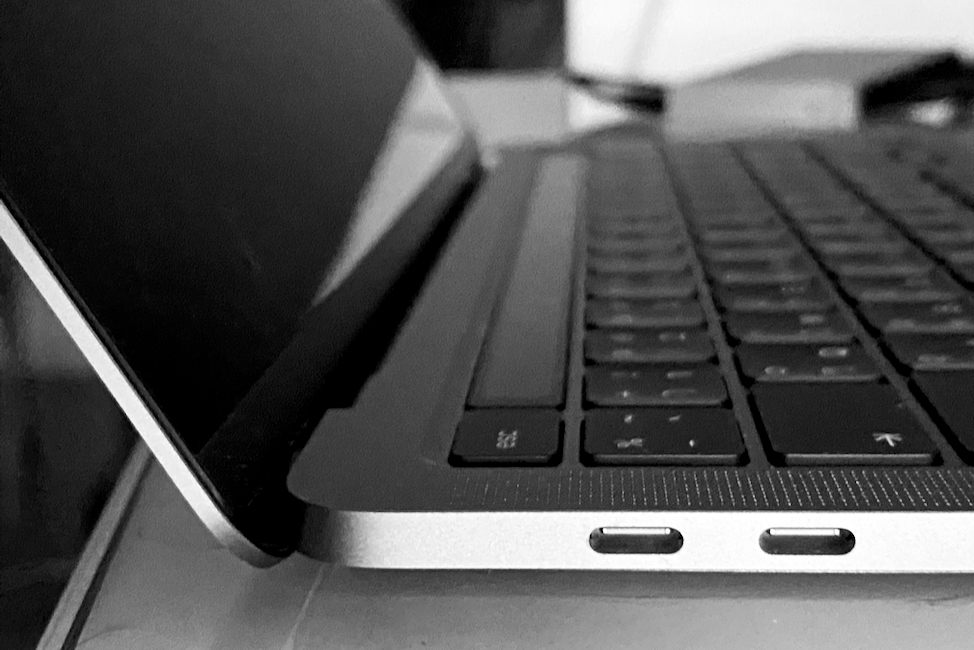|
|
Saturday Notes: Not Anyone's Hill to Die for: Facebook, Apple and AdvertisingBy Graham K. Rogers
One of the bars to moving all my operations to the M1 MacBook Pro immediately is the lack of ports. Not that I could not do it; I am just happier round the end of semester holding off. I knew that it only had 2 ports when I bought the Mac of course. I also have the spare MacBook Air that also has the same 2-port setup. While the limit with that Mac has not caused me any problems, the 4 ports of the Intel MacBook Pro are put into full use when I am online with students: screen, power, cam and iPad Pro (for showing students how I do online markups of their work). With the M1 Mac I will not be able to do all this right away.
 M1 MacBook Pro
As I wrote in the Tuesday Diversion I had heard nothing and when I looked at the site was unable to find any information about my order, suspecting that a network problem at my office had filed this with infinity, instead of OWC. At the weekend, I wrote and on Wednesday morning (Tuesday afternoon in the USA) a reply asked me for my full ordering address details. I replied and within minutes had a reply confirming that the order had been placed and would be filled when the new hubs arrived. That problem is on the way to being solved. When a short survey email arrived a few minutes later I was (unusually) happy to complete it. The new 5nm chip technology with Apple Silicon raised a few eyebrows and Intel made some moves to secure 7nm foundry supplies. Apple uses TSMC (Taiwan Semiconductor Manufacturing Company) as a supplier who (Patently Apple reports) have announced its anticipated 3nm process will begin producing 3nm chips sometime in 2023 for Apple. The report also notes that 2nm chips are under development. In a related item, the new Snapdragon 888 developed by Qualcomm that will power the next Android phones has been benchmarked and shown to be slower than Apple's A14 processor in the current iPhone 12 Pro. AnandTech reports on the benchmark tests shared by Qualcomm and comments on the different sets of results, concluding that the new chips will not disappoint.
 Tenet - AppleTV+
I was reminded of this by a report this week from AppIensider who looked at a comparison between the M1 MacBook Air and a Surface Pro X. Both have ARM chips. Benchmarking showed that the Mac was considerably more powerful. This is not unexpected as the Surface is still really a prototype, with Microsoft's 64-bit x86 emulator still in beta. As interesting as this is, what I would like to see is a comparison between the current M1 and a high-level PC running Windows. That would be a little more realistic.
 M1 Cores - Image curtesy of Apple
I noted a week ago how Oculus users had been forced to switch to Facebook accounts, thus making their data accessible to "Facebook Central Control". The Netflix documentary on how online social networking sites use or data should also be factored in to this. In an article on BoingBoing (Rob Beschizza) it is explained that FB is to move UK user data to the California plan which has fewer restrictions than EU controls. A note on this Boing-Boing article: it has the creepiest image of the Facebook CEO that I have ever seen: the eyes move. Over the last few days a few more Facebook foibles have come to my attention, such as the Australian Government's actions over Facebook's alleged use of Onavo data, when it promised it wouldn't (TechCrunch). First, however, that new Apple information to show how my data is used by a developer. I began with Facebook Messenger on the Mac App Store and took a screen shot of the areas that Apple identifies as being at risk. I had been aware of most areas from which data might be collected, but one or two, such as Health and Fitness, and Sensitive Information - whatever that means - had not been evident.
 Data use by Facebook
Apple has responded to the advertisement that Facebook placed in the Wall Street Journal (that in itself is indicative - hardly a fanfare for the common man) and this is reported in a number of sources, like MacRumors (Joe Rossignol ):
We believe that this is a simple matter of standing up for our users. Users should know when their data is being collected and shared across other apps and websites - and they should have the choice to allow that or not. App Tracking Transparency in iOS 14 does not require Facebook to change its approach to tracking users and creating targeted advertising, it simply requires they give users a choice. The article adds how Apple has built in some ways in which developers can respond and make text changes to inform users, giving them informed choice. This is not the first time that Apple and Facebook have clashed, but Facebook may be on the back foot this time, particularly with regard to other threats it faces in the USA, EU and Germany (Oculus). Apple and Google are also targeted in the proposed EU legislation, although if user data is the reason for this, Apple has less of a risk, although who knows with the USA or EU: politicians do not like to feel that something is beyond their ability to control. Facebook insists Apple is motivated here by profit and not privacy, which is a touch hypocritical coming from that source. Zuckerberg personal wealth is currently $100.8 billion. It is a bit like millionaires complaining when charities feed the poor. Further to that comment from Apple, Tim Cook put out a similar Tweet which was highlighted by William Gallagher (AppleInsider):
We believe users should have the choice over the data that is being collected about them and how it's used. Facebook can continue to track users across apps and websites as before, App Tracking Transparency in iOS 14 will just require that they ask for your permission first. A Tweet is considerably cheaper than two full page Wall Street Journal advertisements. Facebook and Google got rich on using customer data and providing advertisements. Both sell the data to external sources. Apple which is a hardware company and does not sell opaque-ware like this other pair, has several ways (even with the use of devices and software) for customers to opt out. The claim that Apple makes, that it never sells customer data has been breached a couple of times - neither does Microsoft officially - but it is not the core of the business. Neither Google nor Facebook could claim that. Trying to use small businesses as a shield is disingenuous. This is not something that Tim Cook thought about over breakfast one morning. The use of data from users - you, me, anyone else - has been an ongoing worry for several people. I have been teaching about this for a few years, and it is probable that Apple management have also been concerned. These labels are just another way to alert the user, not to take away Mark Facebook's billions. You can opt out of sharing your data if you wish: it should not be up to the developer. I share data with Apple regarding usage as I think this is useful to help produce improvements. I don't have to; I choose to. Stephen Warwick at iMore has just written about an Axios report that shows Facebook and FB Messenger use more user data than competitors. The Axios chart shows other data-sucking apps. So, Yes, Mark Zuckerberg is on shaky ground here.
It was reported on Thursday (Patently Apple and others) that Facebook had opened a web page with small business testimonials. Just like that. The claim that small businesses could see a cut in rates and using the emotive "in a pandemic" is clever but does not hold up particularly in the light of Facebook's own advertising. I used this for eXtensions a few years back, paying the rates for exposure to promised thousands (in reality hundreds) of online users, but after a short while I noticed the numbers dwindling, until, just before I stopped this, less than a hundred hits were shown for the same price as promised thousands. When I questioned this, I had a boilerplate reply that would have done justice to airline PR. The only reason I use Facebook now is the ease of communication with students but my patience has been paper thin for a couple of years. Instagram and Cambridge Analytica did not help, nor did seeing the robotic evasiveness of Zuckerberg in front of that committee, nor the help that Facebook is now providing Fortnite. Several sources have reported that a judge has ordered both Tim Cook and Craig Federighi to testify in that case and has also demanded documents be produced. On the other hand, Facebook is meekly disabling some features on Instagram and Messenger to comply with new EU regulations (Tom Warren, The Verge). Where are the full page advertisements for that? As a note, Google, which is already under some pressure, is now facing an additional lawsuit brought by a coalition of states, "for anticompetitive behavior" ( John Gruber, Daring Fireball). As an additional late note, I see in a Tweet (Kaz Weida) that Breitbart (reliable source?) has alleged in a Tweet that Zuckerberg paid for the election judges and for dropboxes; plus paid officials to board up windows; and also bought the election machines. Now I am no fan of Mr Robot, but. . . .
 Breitbart on Facebook
A few weeks ago there was some information from Ilford concerning a rereleased Sprite35_II camera ( Jaron Schneider, Petapixel. These were quite popular before digital cameras arrived and with film growing in popularity now this seems like a smart move. Nikon just ceased production of its last film camera, so apart from specialist devices and a few toy cameras, there is just the used market where prices are rising. If I were to sell some of my older cameras, I could make a healthy profit, but that is not the point. I use digital for work-related images, but film (mostly B&W) because I enjoy it.
Graham K. Rogers teaches at the Faculty of Engineering, Mahidol University in Thailand. He wrote in the Bangkok Post, Database supplement on IT subjects. For the last seven years of Database he wrote a column on Apple and Macs. After 3 years writing a column in the Life supplement, he is now no longer associated with the Bangkok Post. He can be followed on Twitter (@extensions_th) |
|




